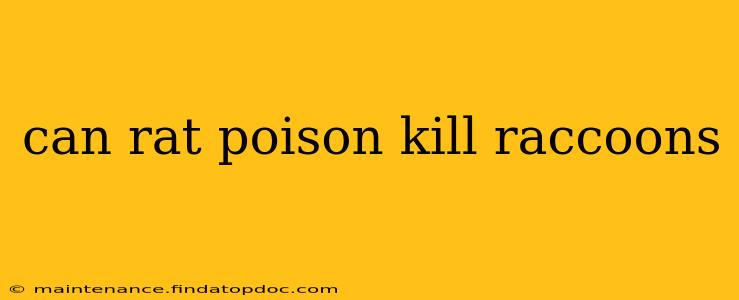Can Rat Poison Kill Raccoons? The Dangers of Using Rodenticides on Wildlife
The short answer is: yes, rat poison can kill raccoons, but using it to do so is dangerous, illegal in many areas, and generally unethical. While rodenticides are designed to target rodents, raccoons are opportunistic omnivores and may ingest poisoned bait intended for rats or mice. This can lead to a slow, painful death for the raccoon and potentially harm other animals in the ecosystem through secondary poisoning.
Before we delve into the specifics, it's crucial to understand that dealing with nuisance wildlife requires a responsible and humane approach. Simply resorting to poison is rarely the best solution and often carries significant risks.
What Happens if a Raccoon Eats Rat Poison?
Raccoons, like other animals, can suffer from various symptoms after ingesting rodenticides, depending on the type of poison and the amount consumed. These can include:
- Internal bleeding: This is a common result of anticoagulant rodenticides, which prevent blood clotting. The raccoon may experience nosebleeds, bloody urine or feces, and ultimately, internal hemorrhaging.
- Neurological problems: Some rodenticides affect the nervous system, causing seizures, tremors, paralysis, and disorientation.
- Organ damage: Chronic exposure to even low levels of poison can cause long-term damage to vital organs such as the liver and kidneys.
- Death: Death from rodenticide poisoning is often slow and painful, potentially taking days or even weeks.
Is it Legal to Kill Raccoons with Rat Poison?
No. In many jurisdictions, it is illegal to intentionally kill raccoons (or other wildlife) with poison or any other means without proper permits and licenses. The use of rodenticides is often regulated to minimize the risk to non-target species. Violating these regulations can result in hefty fines and legal repercussions.
What are the Safer Alternatives to Poisoning Raccoons?
Instead of resorting to lethal methods, consider these humane and legally sound alternatives for dealing with nuisance raccoons:
- Exclusion: Prevent raccoons from accessing your property by sealing entry points, securing garbage cans, and removing potential attractants like pet food.
- Repellents: Use commercially available raccoon repellents, which are designed to deter them without harming them.
- Trapping and Relocation: Contact your local animal control or wildlife rehabilitation center. They can safely trap the raccoons and relocate them to a more suitable habitat. This is generally the most humane and effective method.
- Professional Wildlife Removal: Consider hiring a professional wildlife removal service. They have the expertise and equipment to handle raccoon removal safely and legally.
What if I Find a Raccoon that's Been Poisoned?
If you suspect a raccoon has ingested rat poison, do not attempt to handle it yourself. Contact your local animal control or wildlife rehabilitation center immediately. They have the knowledge and equipment to safely handle the situation and provide appropriate care or euthanasia if necessary.
How Can I Prevent Raccoons from Getting into My Rat Poison?
Properly storing and using rodenticides is crucial to prevent accidental ingestion by non-target animals. Follow the manufacturer’s instructions carefully and use bait stations that are designed to prevent access by larger animals.
In conclusion, while rat poison can kill raccoons, it's a cruel, often illegal, and environmentally irresponsible method. Focus on humane and legal alternatives to ensure both the safety of wildlife and your compliance with local regulations. Prioritizing prevention and responsible wildlife management is always the best approach.
